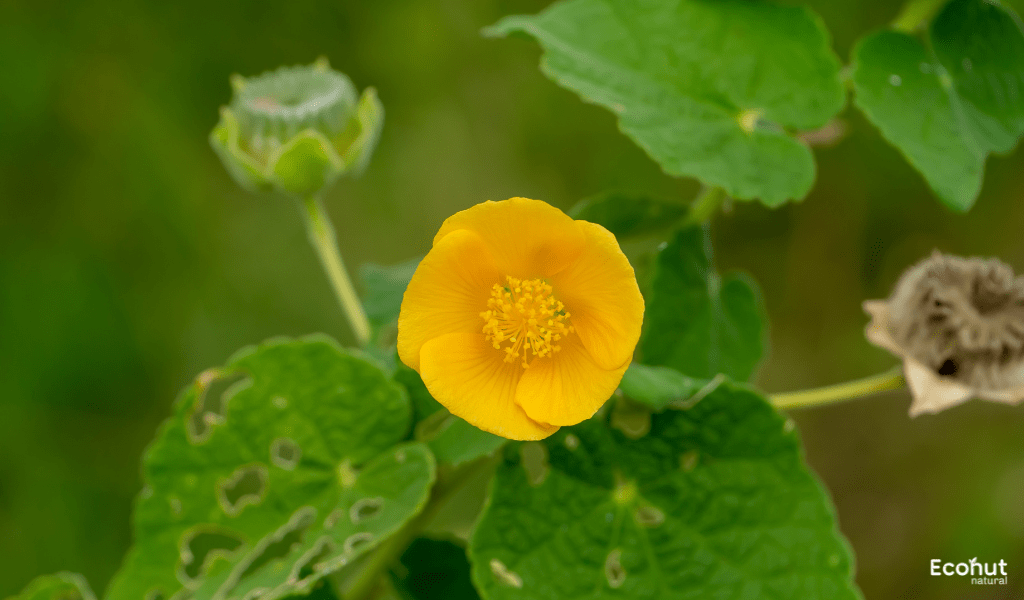Atibala( Abutilon Indicum), is a widespread roadside weed that has stunning golden-yellow blossoms. Atibala is a complete cure-all for anything from fever and general debility to headaches, syphilis, heart problems, bleeding disorders, paralysis, urethritis, hemorrhagic septicemia, leprosy, cataracts, boils and ulcers, diarrhea, leg pains, uterus displacement, snakebite.
Abutilon Indicum, or Atibala, is a member of the Malvaceae family. Its Hindi name is Kanghi, and its English name is Country Mallow. It is a type of perennial herb that grows to a height of three meters. It is typically found in hotter regions than others and grows in sub-Himalayan regions at elevations of up to 1200 meters.
Description
The majority of these plants are located on tropical islands. Tamil Nadu is where most of it is cultivated in India. Due to its attractive appearance, this plant is well-liked in various areas. Its significant therapeutic qualities make it significant elsewhere. It is possible to produce medicine from the entire plant.
Botanical Name:
Abutilon Indicum
Family:
Malvaceae
Leaves:
The leaves on the stalk are simple, alternately placed, and stipulate. They are oval or heart-shaped, with serrated edges and pointy points. The leaves have a hairy upper surface and a smooth, glabrous underside.
Flowers:
Because the flowers are axillary, they develop in the void left by the separation of the stem and leaf stalk. They feature five orange-yellow petals and are tiny and uniform in shape. The blooms have both male and female reproductive organs, making them bisexual.
Roots:
The long, tap-like roots have a smooth, light brown exterior. They have a calming and lubricating effect on mucous membranes, which makes them demulcent.
Seeds:
The seeds are tiny, black, and kidney-shaped. They are housed inside a fruit that resembles a capsule and splits open when ripe.
Habitat:
Atibala (Abutilon Indicum) it is a type of perennial herb that grows to a height of three meters. It is typically found in hotter regions than others and grows in sub-Himalayan regions at elevations of up to 1200 meters.
Parts Used:
- Fruits
- Leaves
- Bark
- Flowers
Dosage:
- Juice – 10 to 20 ml
- Powder- 3 to 6 grams
Chemical Constituents
Numerous pharmacological characteristics of Abutilon indicum include hepatoprotective, immunomodulatory, wound-healing, analgesic, antimalarial, antibacterial, and hypoglycemic effects. Carbohydrates, steroids, glycosides, flavonoids, tannins, and phenolic substances are the primary chemical components.
Synonyms
Rishyaprokta, Balika, Rishagadha, Bhuribala
Other Language Names of Atibala (Abutilon Indicum)
Punjabi name – Mudra
Madrassi name – Makanne
Telgu name -Tutturabendha
Sanskrit name – Kanktika
Hindi name – Kanghi, Kakahi
Bengali name – Petari, Jhanpi
Malayalam name – Vellula
Gujarati name -Khapat, dabli, Kansika
Scientific Classification
| Kingdom | Plantae |
| Division | Magnoliophyta |
| Class | Magnoliopsida |
| Order | Malvales |
| Family | Malvaceae |
| Genus | Abutilon |
| Species | Abutilon indicum (L.) |
Ayurvedic Properties
Rasa (Taste) – Madhur (Sweet)
Guna (Quality) – Guru (Heavy), Snigadh (Moist)
Veerya (Potency) – Sheeta (Cold)
Vipaka (Post digestive effect) – Madhur (Sweet)
Karma (Action) – Balances the Vata and Pitta dosha.
Atibala (Abutilon Indicum) Uses
- This plant is useful for treating bleeding disorders and for accelerating the healing of wounds and other injuries.
- This plant works wonders for preserving both the quality and quantity of sperm.
- This plant is utilized to boost our defenses against many illnesses.
- A mouthwash made from a decoction of its green leaves is used to treat toothaches and aching gums. It can also be used for pooling.
- The root’s infusion is used to treat fever and hematuria, or it acts as a body coolant.
Atibala (Abutilon Indicum) Benefits
Cures Liver Anomalies:
Known as “Sarva roga niramani,” Atibala has strong anti-biliary and hepatostimulative qualities by nature, much like the bitter herb Kutki. This makes it an effective treatment for illnesses like jaundice, which primarily affect the liver. By secreting bile, the plant helps the liver function properly and restores normalcy to the liver’s enzyme levels. Additionally, it improves liver function and cleanses and detoxifies the liver.
Helpful for arthritis:
Joint pain, stiffness, and immobility are symptoms of arthritis. Atibala lowers edema and relieves discomfort. These symptoms of arthritis are somewhat alleviated by the extremely potent anti-inflammatory action.
Skin health:
The skin responds miraculously to atibala. The skin’s moisture content can be raised by applying a mixture of Atibala (Abutilon Indicum) powder and coconut water on the skin. It relieves dry skin and lessens the appearance of wrinkles brought on by aging.
Protects the liver:
With its high level of hepatoprotective activity, atibala is beneficial for liver protection. It improves digestion and naturally shields the liver. Ulcers can be treated and helped to heal with the use of the leaf juice.
Improves Kidney Functions:
The traditional herb prevents and treats gout by helping the kidneys excrete extra uric acid and keeping the uric acid level in the kidneys stable. This enhances the kidneys’ healthy functioning. Atibala’s anti-lithiasis characteristic helps to break up or minimize kidney stones that have already developed, which in turn helps to avoid a number of underlying medical disorders such polycystic kidney disease, gout, kidney stones, and cystitis.
Atibala (Abutilon Indicum) Side Effects
Digestive issues:
Constipation, diarrhea, or upset stomach is possible side effects of Atibala.
Allergic reactions:
Atibala allergies can occur in people who are allergic to plants of the Malvaceae family.
Pregnancy and breastfeeding:
Pregnancy and lactation safety is not fully established. It is best to speak with a physician before using.
Read Also: Angurshafa, Soochi, (Atropa belladonna) – Properties, Uses, Benefits & Side Effects
Conclusion
Whether it is referred to as a weed or medicinal herb, Atibala has a wealth of health advantages. It is widely used to treat malnutrition, the flu, feverish conditions, liver problems, respiratory diseases, preventing viral infections, kidney problems, promoting digestion, improving skin health, and many other conditions because of the beneficial effects of the essential bio-active ingredients and their many therapeutic properties.
FAQS
What advantages does Abutilon offer?
In Ayurveda, atibala is regarded as balya, which implies that it promotes vigor, strength, and energy. It is applied to joint problems and facial paralysis. It is also recommended as an aphrodisiac and uterine tonic.
What is Abutilon indicum used for?
Rheumatoid arthritis symptoms may be better controlled with atibala. It has anti-inflammatory and analgesic properties. Additionally, it lessens inflammation in the joints. Abutilon indica provides significant defense against RBC membrane damage and denaturation of proteins brought on by hypotonic saline.
How to use atibala for piles?
Powdered dried leaves of Abutilon indicum 3–6 grams, twice or three times a day, with warm water after meals, or as prescribed by a doctor Cures piles and eases constipation.

